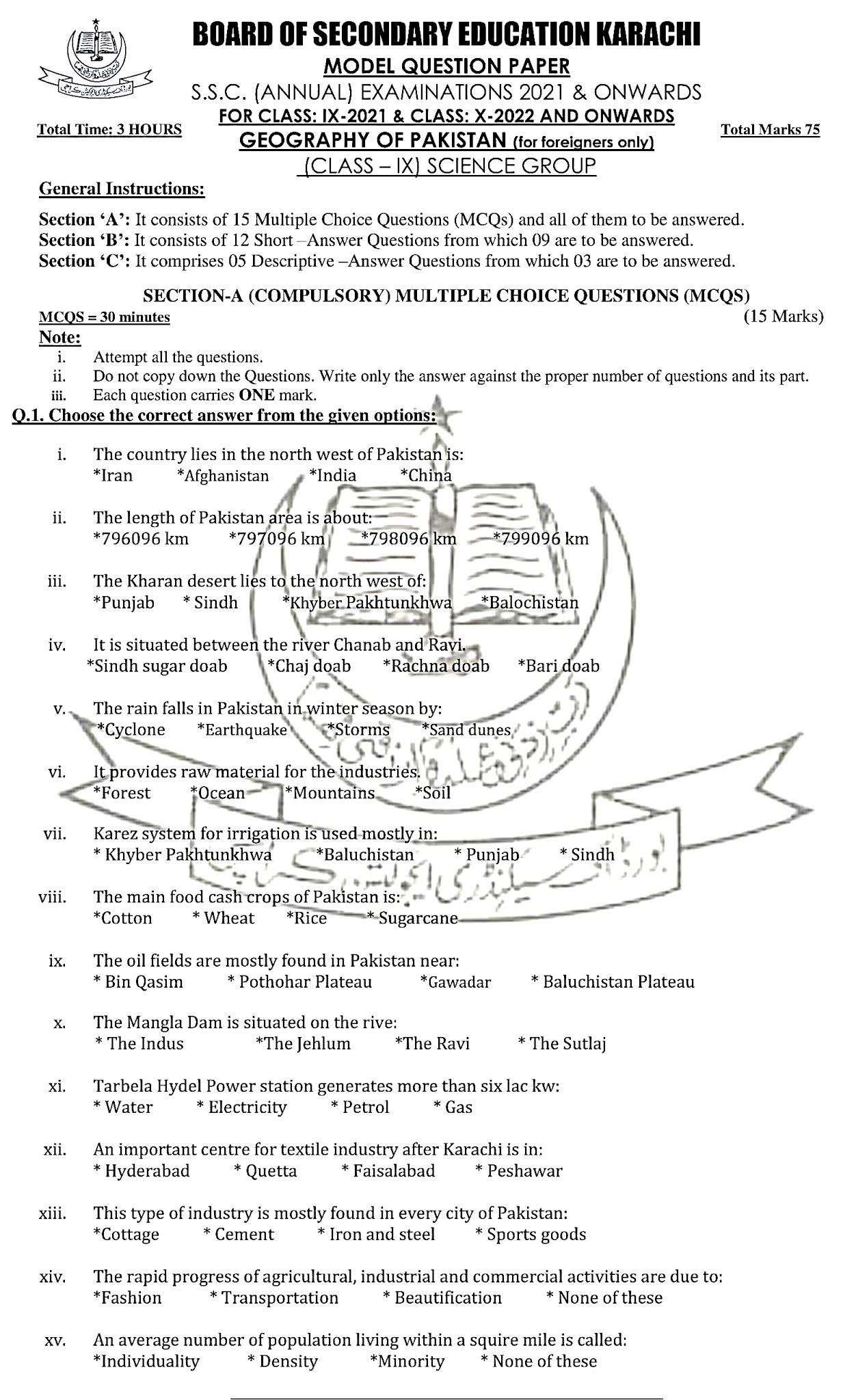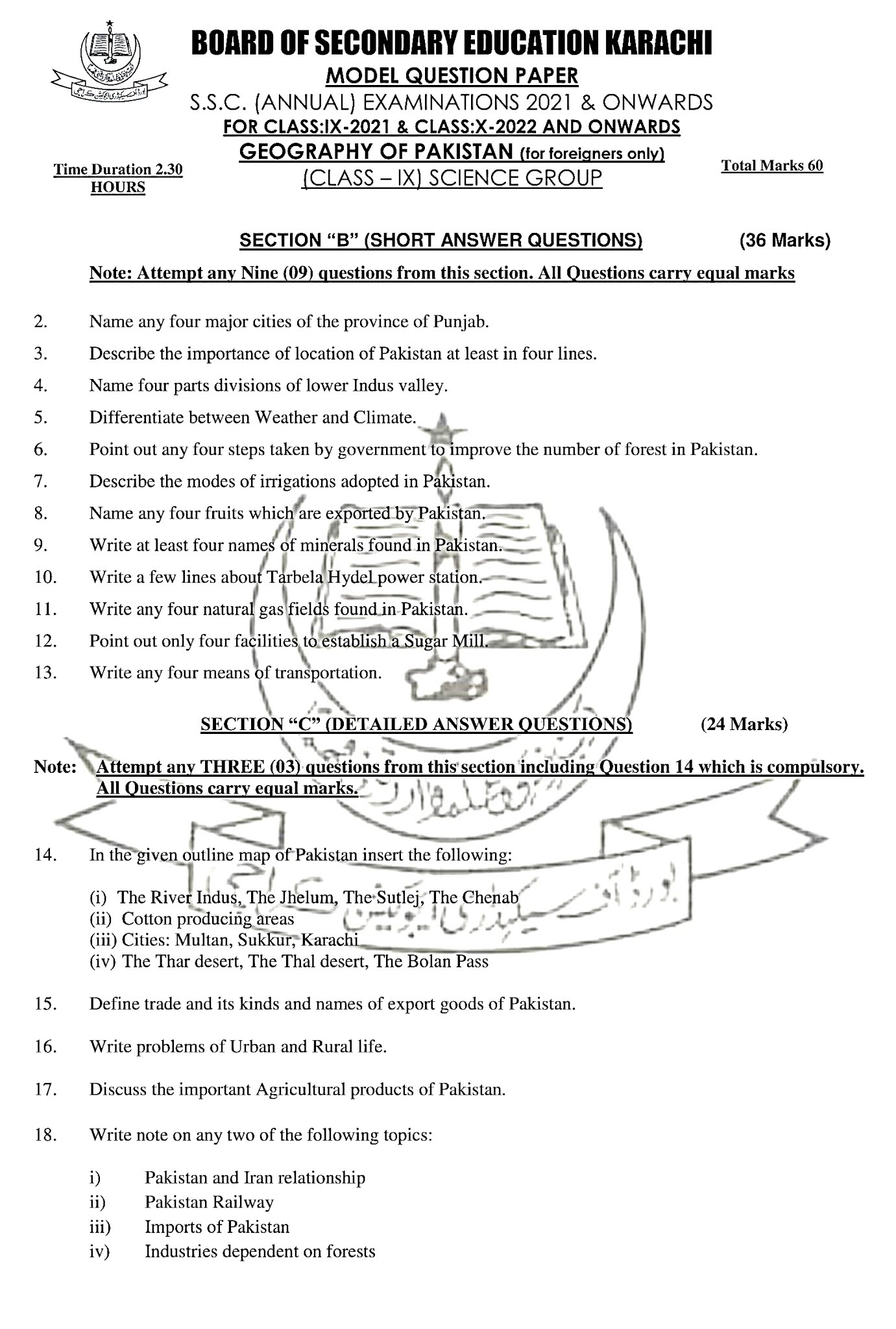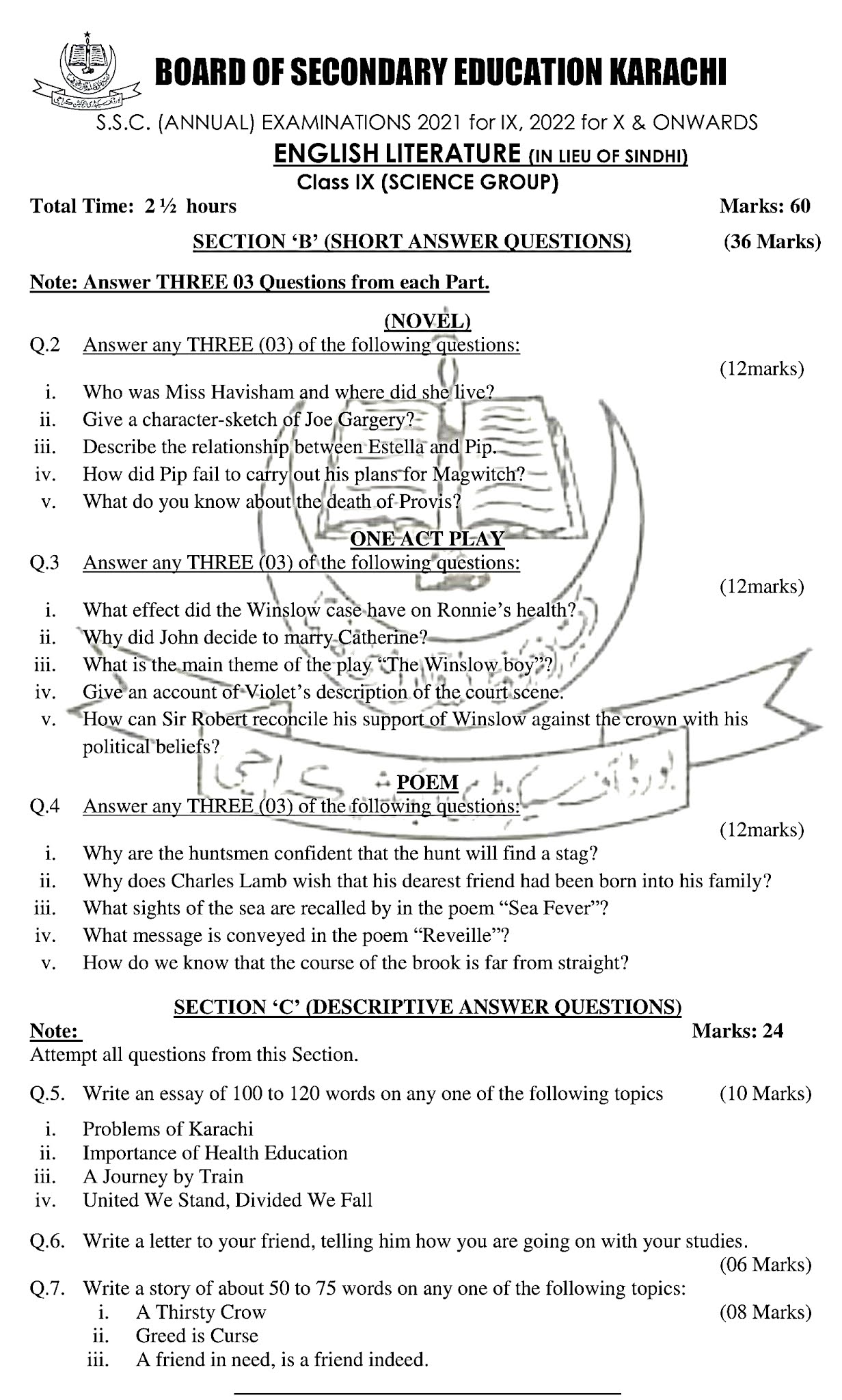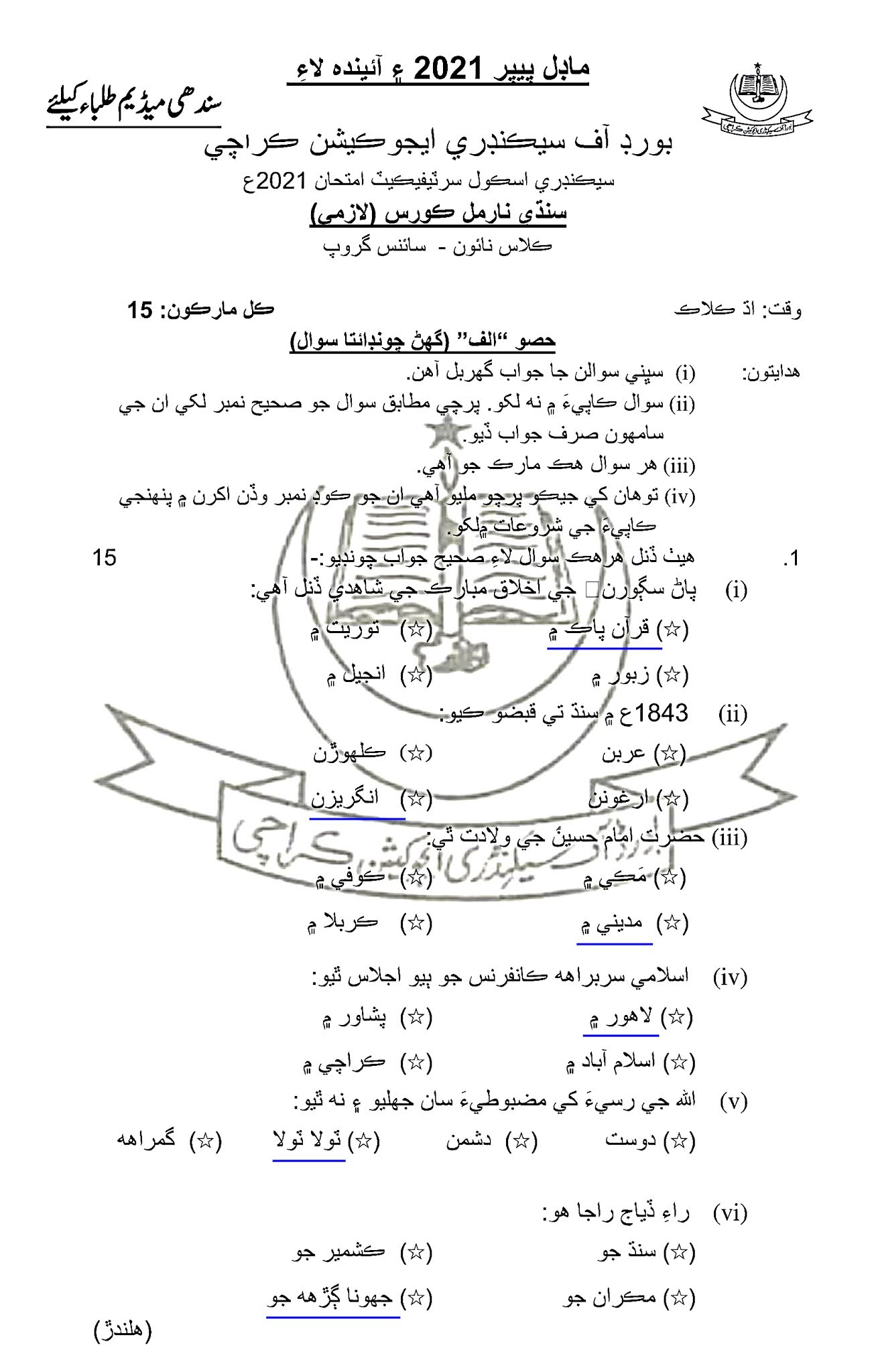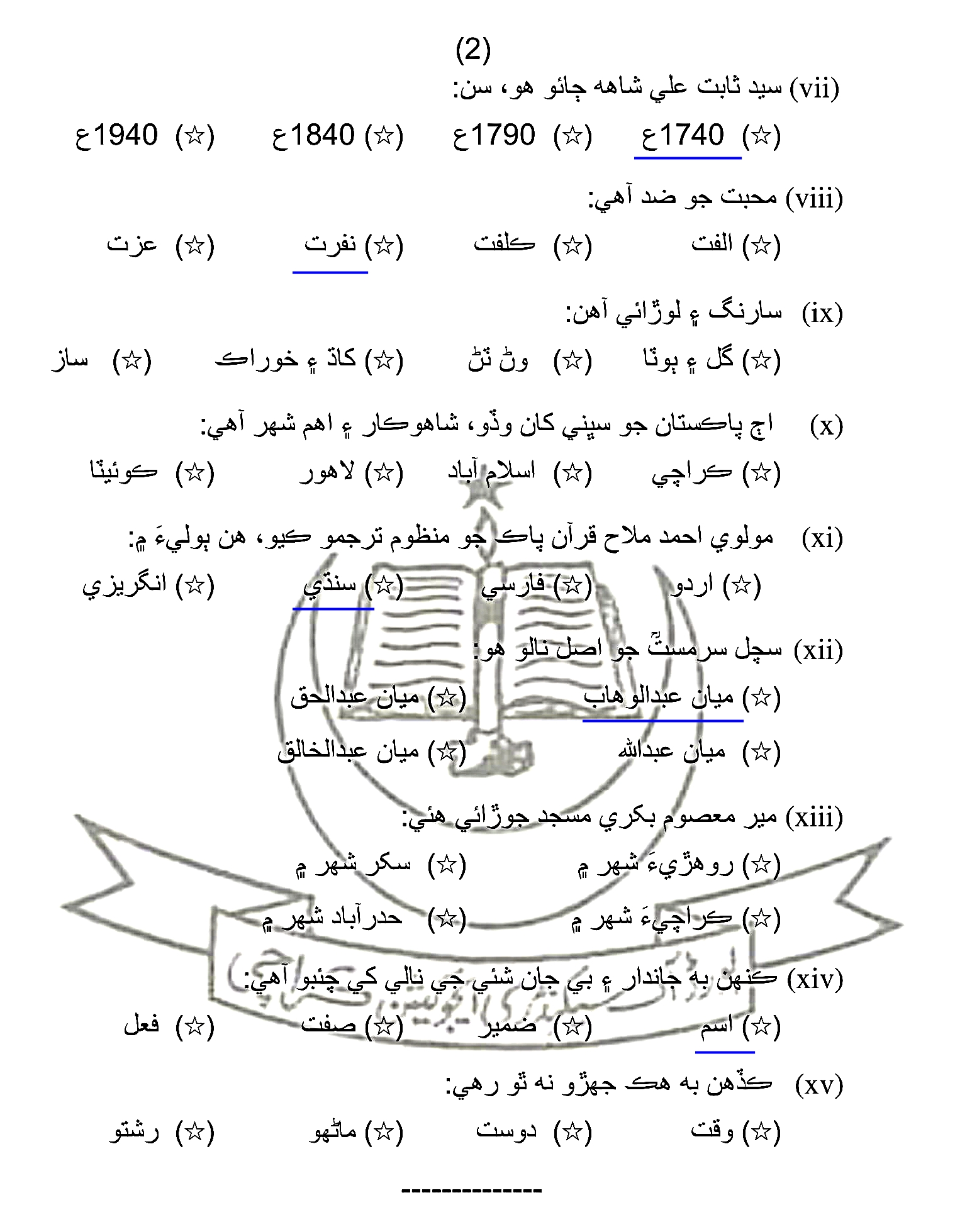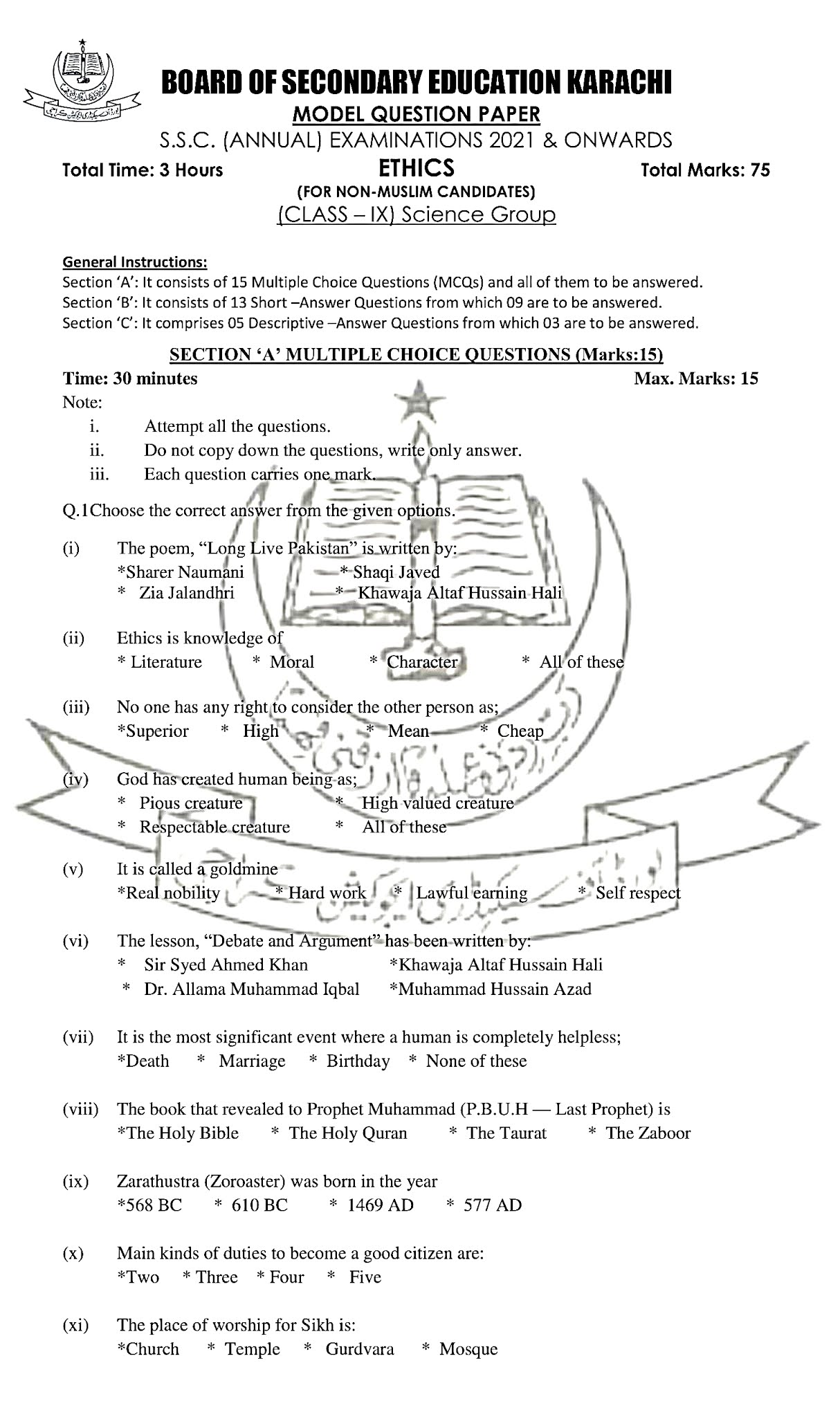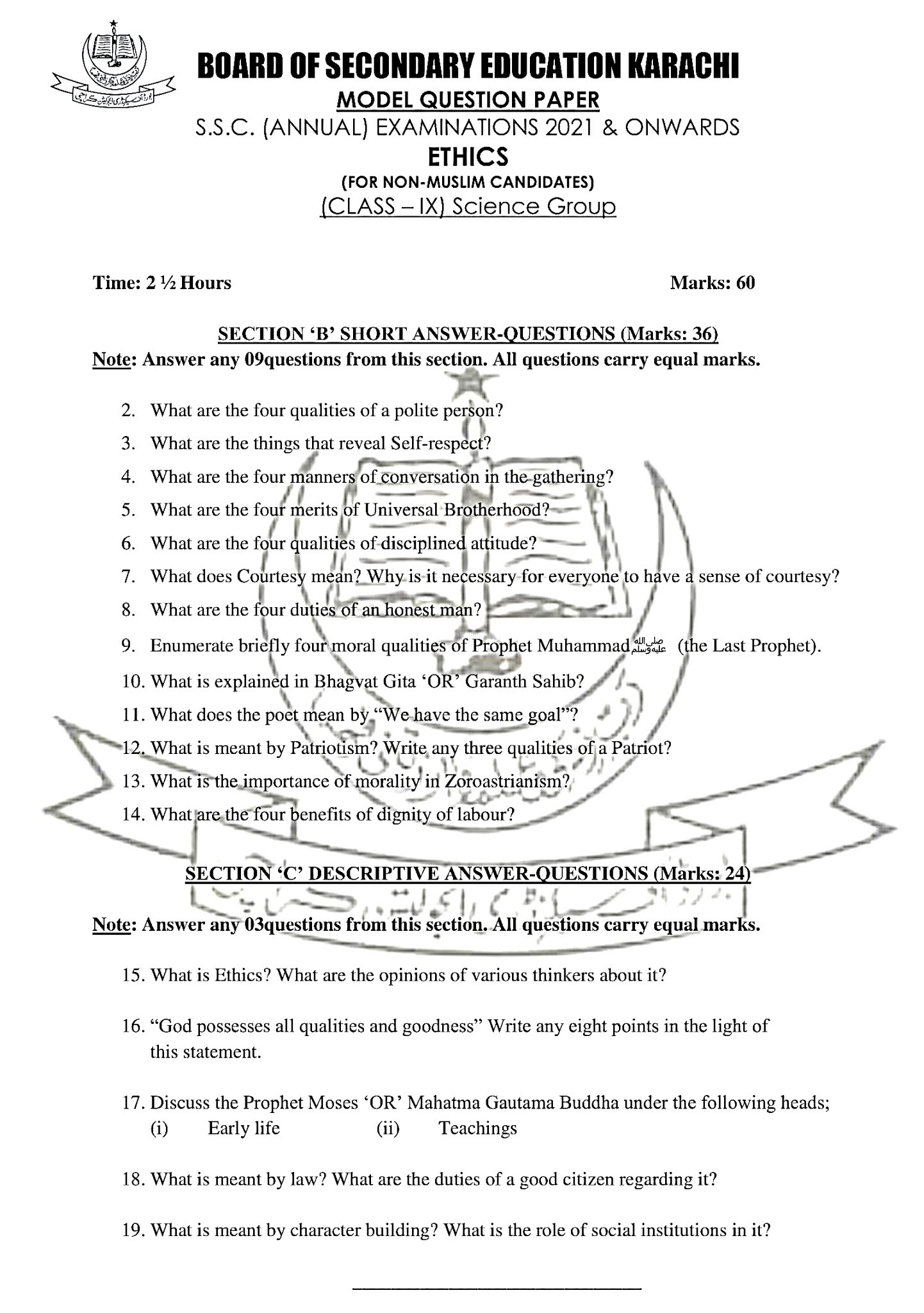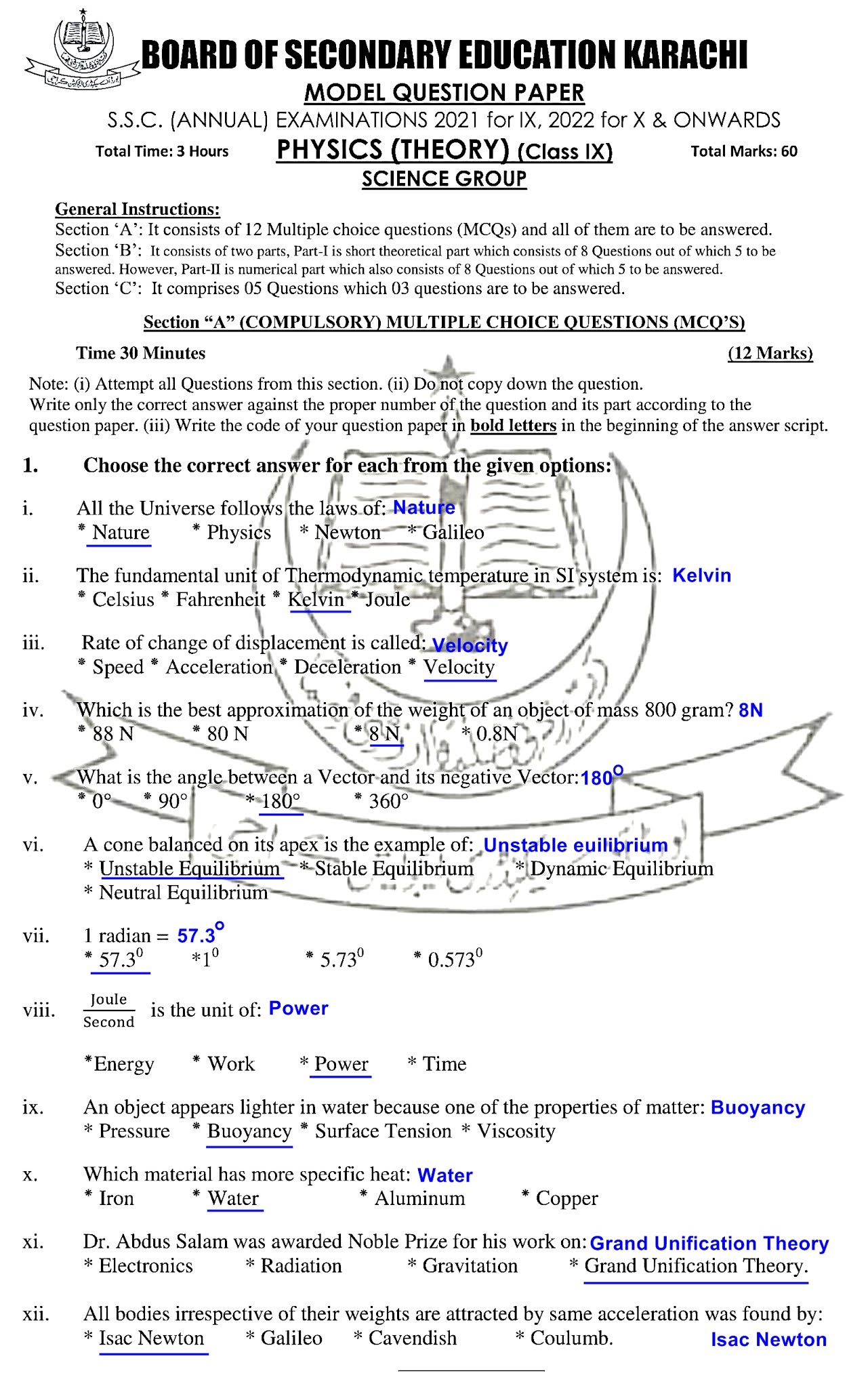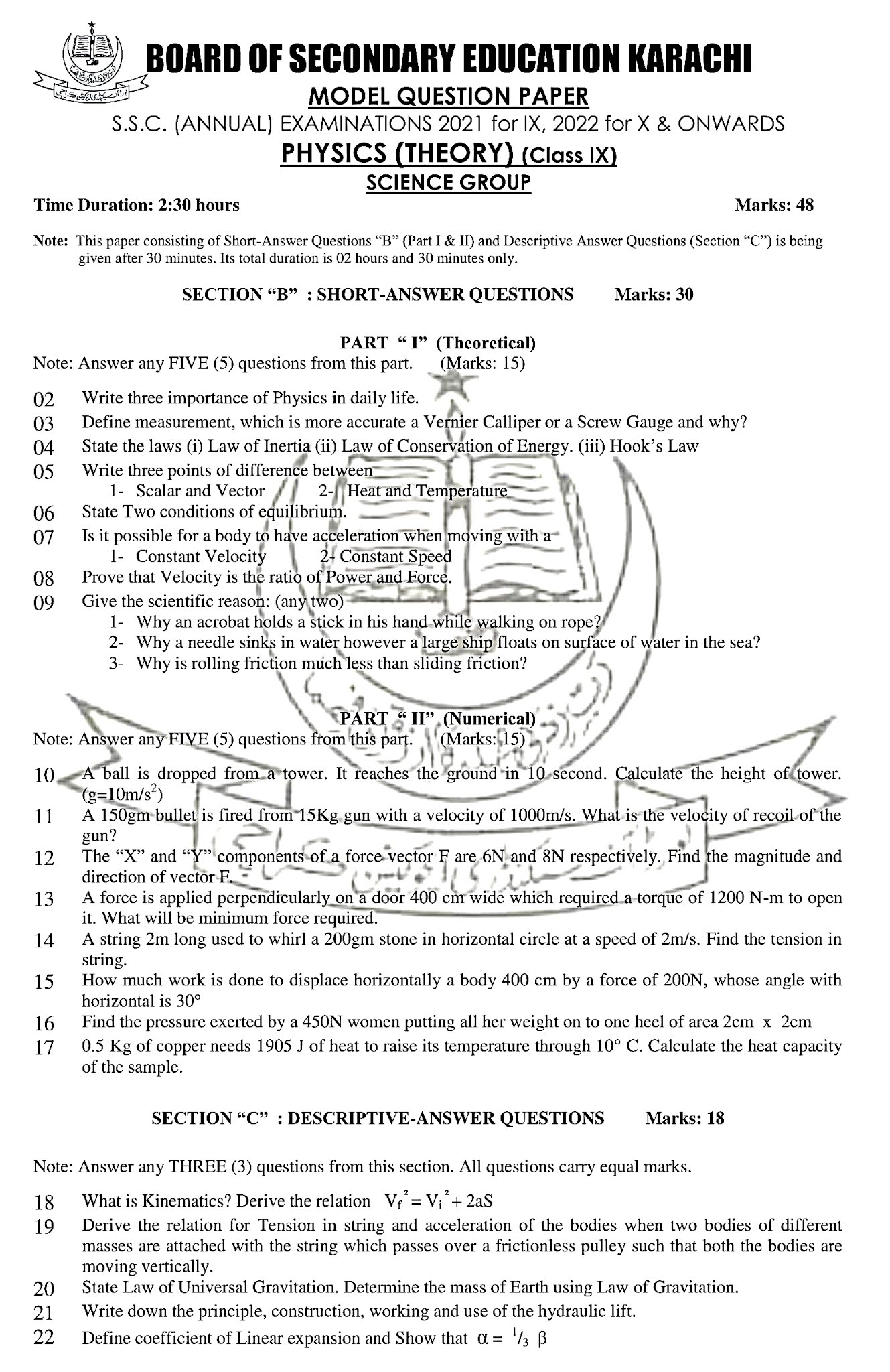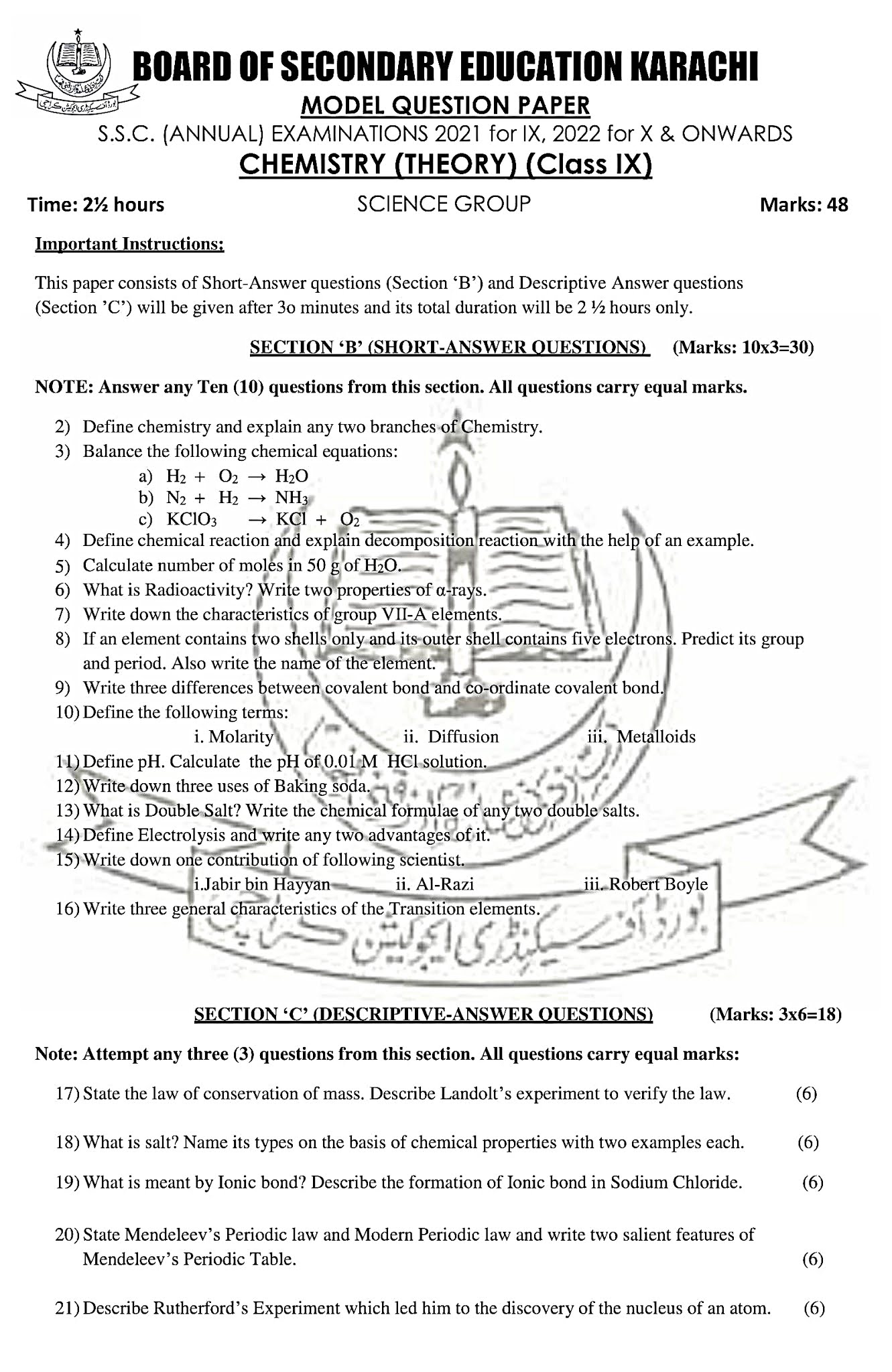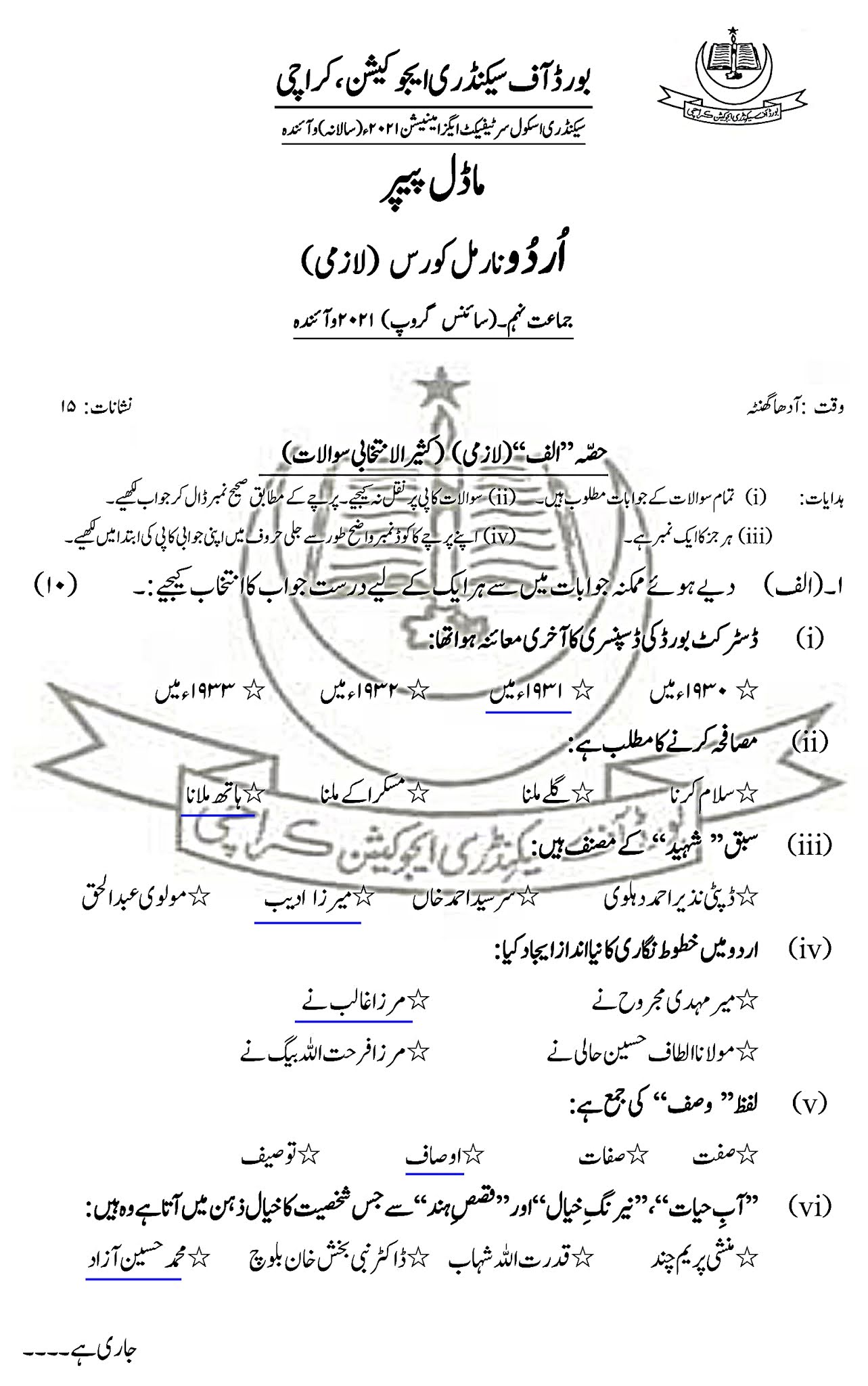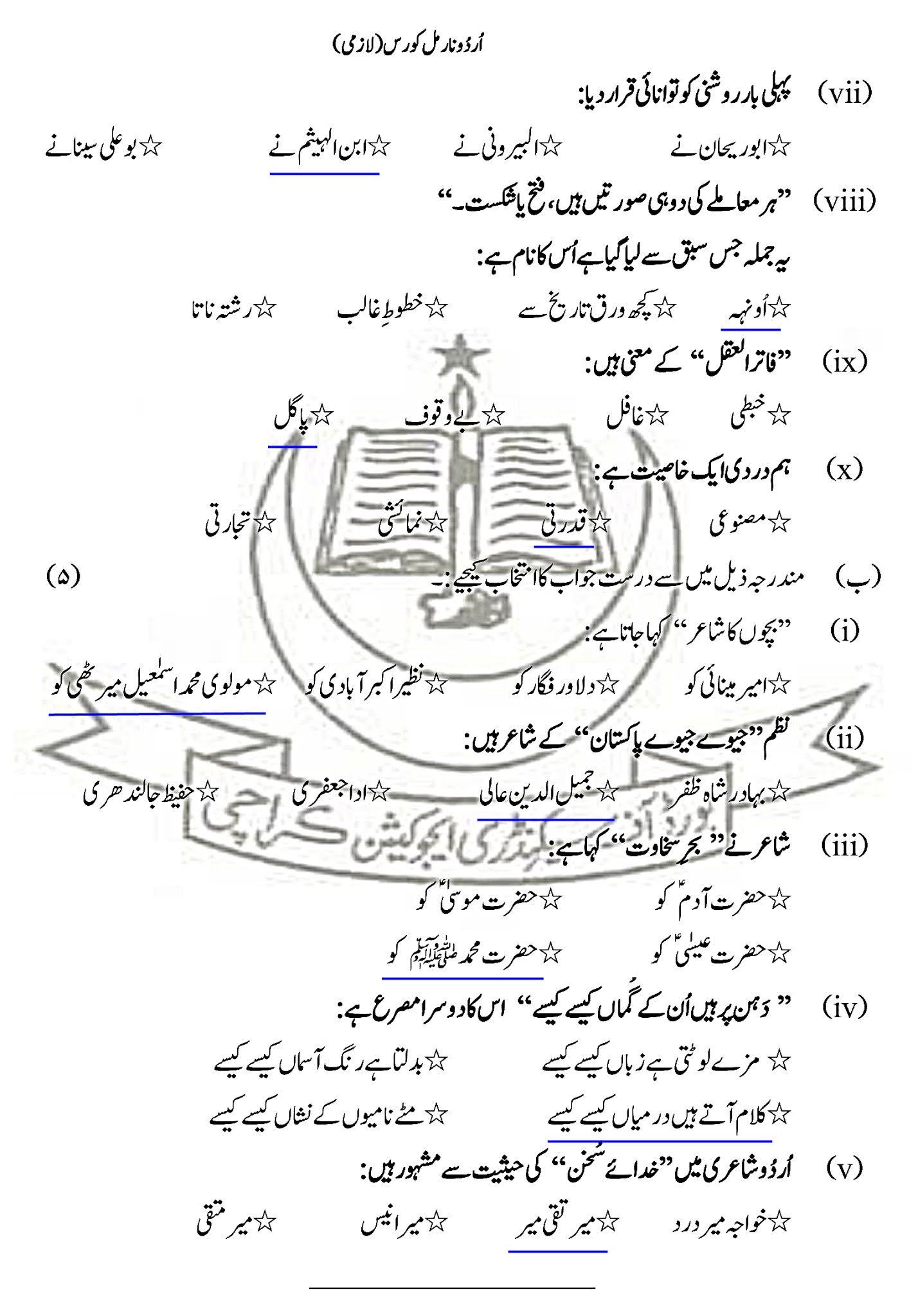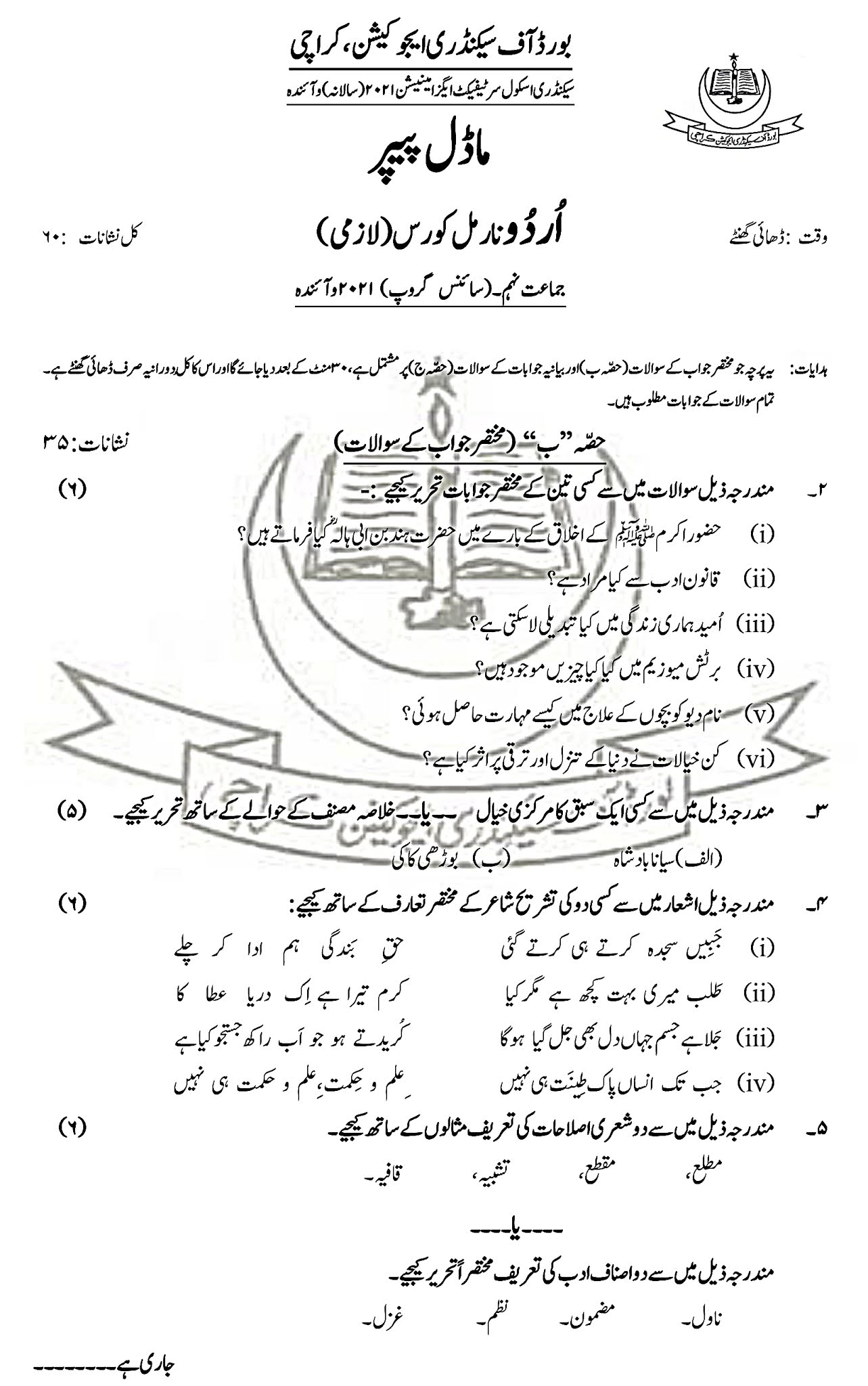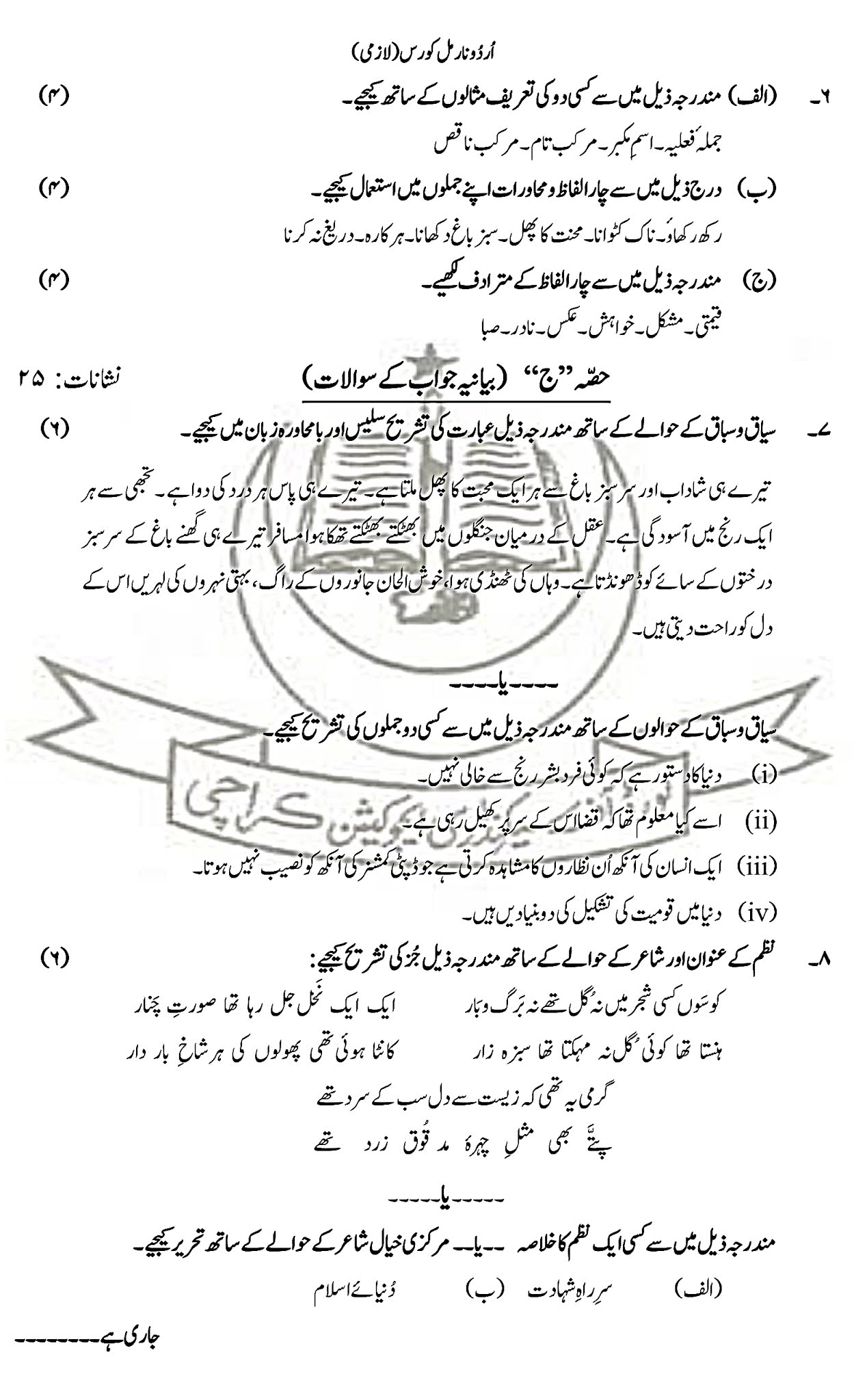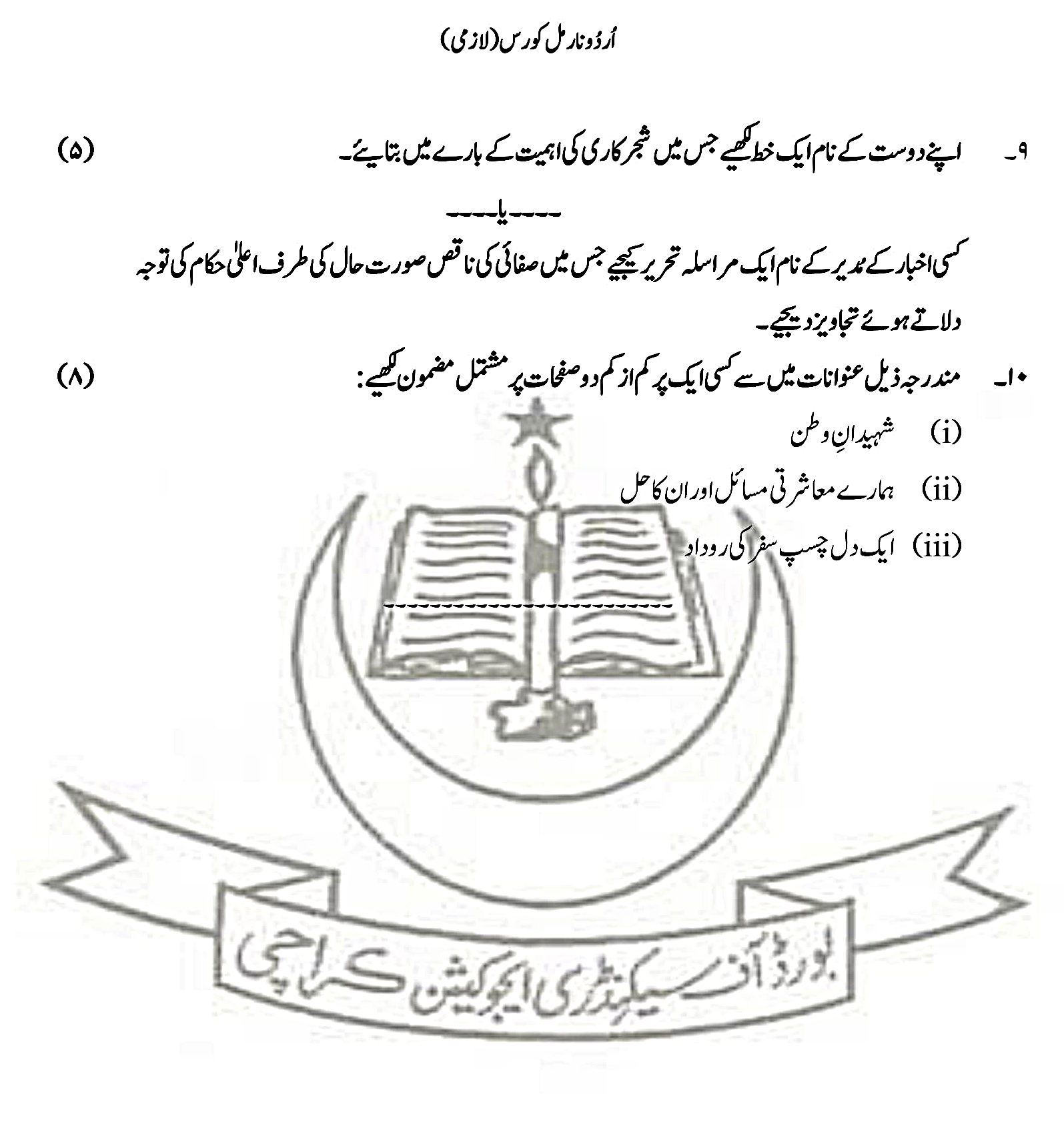Search This Blog
Sunday 10 January 2021
English Literature (in Lieu of Sindhi) - Model Paper - For Class X (Science Group) - 2022 and Onward
GO TO INDEX
English Literature
(in Lieu of Sindhi)
For Class X (Science Group)
Model Papers 2022 and Onward
Sindhi Normal Course (For Sindhi Medium Candidates) - Model Paper - For Class IX (Science Group) - 2021 and Onward
GO TO INDEX
SINDHI NORMAL COURSE
(For Sindhi Medium Candidates)
For Class IX (Science Group)
Model Papers 2021 and Onward
ETHICS (For Non-Muslims Candidates) - Model Paper - For Class IX (Science Group) - 2021 and Onward
GO TO INDEX
ETHICS
(For Non-Muslims Candidates)
For Class IX (Science Group)
Model Papers 2021 and Onward
Sunday 3 January 2021
Physics Theory And Practical - Model Paper - For Class IX (Science Group) - 2021 and Onward
Saturday 2 January 2021
Chemistry Theory and Practical - Model Paper - For Class IX (Science Group) - 2021 and Onward
Friday 1 January 2021
Urdu (Compulsory) - Solved Model Paper - For Class IX (Science Group) - 2021 and Onward
GO TO INDEX
URDU NORMAL COURSE
(Compulsory)
For Class IX (Science Group)
Model Papers 2021 and Onward
حصہ "ب" (مختصر جواب کے سوالات) - نشانات (35)
2- مندرجہ ذیل سوالات میں سے کسی تین کے مختصر جوابات تحریر کیجیۓ۔
(i) - حضور اکرم صلی اللہ علیہ والہ وسلم کے اخلاق کے بارے میں ہند بن ابی ہالہ رضہ کیا فرماتے ہیں؟
جواب: ہند بن ابی ہالہ رضی اللہ عنہ جو گویا آں حضرت صلی اللہ علیہ والہ وسلم کے آغوش پروردہ تھے، وہ بیان کرتے ہیں کہ " آپ صلی اللہ علیہ والہ وسلم نرم خو تھے، سخت مزاج نہ تھے۔ کسی کی توہین روا نہ رکھتے تھے، چھوٹی چھوٹی باتوں پر اظہار تشکر فرماتے تھے۔ کھانا جس قسم کا سامنے آتا، تناول فرماتے اور اسکو برا بھلا نہ کہتے۔
(i) - حضور اکرم صلی اللہ علیہ والہ وسلم کے اخلاق کے بارے میں ہند بن ابی ہالہ رضہ کیا فرماتے ہیں؟
جواب: ہند بن ابی ہالہ رضی اللہ عنہ جو گویا آں حضرت صلی اللہ علیہ والہ وسلم کے آغوش پروردہ تھے، وہ بیان کرتے ہیں کہ " آپ صلی اللہ علیہ والہ وسلم نرم خو تھے، سخت مزاج نہ تھے۔ کسی کی توہین روا نہ رکھتے تھے، چھوٹی چھوٹی باتوں پر اظہار تشکر فرماتے تھے۔ کھانا جس قسم کا سامنے آتا، تناول فرماتے اور اسکو برا بھلا نہ کہتے۔
Monday 28 December 2020
English Grmmar - Suffixes and Prefixes
SUFFIXES
Examples:
- agree + ment = agreement (change verb to noun)
- postpone + ment = postponement (change verb to noun)
- willing + ness = willingness (change adjective to noun)
- frank + ness = frankness (change adjective to noun)
- arrive + al = arrival (change verb to noun)
- profession + al = professional (change noun to adjective)
Suffixes Rules
Change The Spelling Of The WordIn some cases, the suffix causes a spelling change to the original (root or base) word. The last alphabet or letter of the word may be dropped or changed, when the suffix is added. Such as:
Example:
-
Words ending with letter -e:
-e may be dropped, when suffix is added begins with vowel, such as:
(i) use + able → usable
(ii) adore + able → adorable - Words ending with letter -y:
-y changes to an i when suffix is added, such as:
(i) beauty + -ful → beautiful
(ii) duty + -ful → dutiful
(iii) heavy + -ness → heaviness
(iv) ready + -ness → readiness
(v) ugly + -ness → ugliness - Words ending with letter -le:
-le changes to il when suffix is added, such as:
(i) able + -ity → ability
(ii) possible + -ity → possibility -
Words ending with letter -t:
-t changes to ss when suffix is added, such as:
(i) permit + -ion → permission
(ii) omit + -ion → omission
Change The Meaning Of The Word
Suffixes sometimes change the meaning of the words, such as:
Suffix -er is added:
-
With adjective, it shows comparative meaning of "more" as:
(i) kind + -er → Kinder
(ii) long + -er → longer
(iii) fond + -er → fonder - With verb, the word can be turned into noun, as:
(i) read + -er → reader
(ii) dance + -er → dancer
(iii) build + -er → builder
Suffix -est added:
-
With adjective, it shows superlative meaning of "the most" as:
(i) kind + -est → Kindest
(ii) long + -est → longest
(iii) fond + -est → fondest
List Of Common Suffixes With Meaning and Examples
Noun suffixes
| SUFFIX | MEANING | EXAMPLES |
|---|---|---|
| -acy | state or quality | privacy, fallacy, delicacy |
| -age | action or process | baggage, village, postage, drainage, marriage, |
| -al | pertaining to | arrival, burial, deferral, regional, functional, musical, accidental |
| -ance /-ence | state or quality of | reliance, defence, insistence, maintenance, eminence, assurance |
| -dom | place or state of being | boredom, freedom, kingdom |
| -ee | - | employee, payee, trainee |
| -eer | engaged in something, associated with something | auctioneer, volunteer, engineer, profiteer |
| -er | someone who performs an action | driver, writer, director, helper, teacher, preacher, dancer |
| -hood | - | brotherhood, childhood, neighbourhood |
| -ion | the action or process of | celebration, opinion, decision, revision |
| -ism | doctrine, belief | capitalism, Marxism, socialism (philosophies), communism |
| -ist | one who | capitalist, Marxist, socialist (followers of philosophies), chemist |
| -ity /-ty | the state or condition of, quality of | brutality, equality, cruelty, probability, abnormality, civility, inactivity, validity |
| -ment | the action or result of, condition of | amazement, disappointment, parliament, movement, retirement, abandonment, establishment, argument, enchantment, achievement, excitement |
| -ness | a state or quality | happiness, kindness, usefulness, fondness, awareness, darkness, sickness |
| -or | a person who is something | distributor, investigator, translator, conductor |
| -ry | - | entry, ministry, robbery |
| -ship | position held | friendship, membership, workmanship, worship, ownership, courtship, internship, citizenship |
| -sion /-tion /-xion | state of being | expression, population, complexion, depression, confusion, tension, compulsion, affection, promotion |
| -th | state or quality | strength, labyrinth, depth, warmth |
Adjective Suffixes
| SUFFIX | MEANING | EXAMPLES |
|---|---|---|
| -able / -ible | capable of being, can be done | drinkable, portable, flexible, preventable, adaptable, predictable, credible, reversible, terrible |
| -al | pertaining to | brutal, formal, postal, natural, criminal, seasonal |
| -ant | inclined to or tending to | vigilant, defiant, brilliant, reliant |
| -ary | of or relating to | budgetary, planetary, military, honorary |
| -en | become | broken, golden, wooden, enlighten, awaken, strengthen |
| -er | action or process, making an adjective comparative | bigger, stronger, faster, fuller, longer |
| -ese | - | Chinese, Japanese, Vietnamese |
| -esque | reminiscent of | picturesque, statuesque, burlesque |
| -est | superlative (degree) | strongest, tiniest, tallest |
| -ful | full of or notable of | forgetful, helpful, useful, grateful, beautiful, wonderful, thankful, doubtful |
| -i | - | Iraqi, Pakistani, Yemeni |
| -ic | relating to or pertaining to | classic, Islamic, poetic, iconic, organic, heroic, domestic |
| ical / cal | having the form or pertaining to | Psychological, Hypocritical, Methodical, Musical |
| -ious / -ous | having qualities of or characterized by | cautious, famous, nervous, gracious, humorous, fabulous, pious, jealous, ridiculous, religious, nutritious |
| -ish | having the quality of | British, childish, Spanish |
| -ive | quality or nature of | active, passive, productive, creative, expensive, expressive, informative, attentive |
| -ian | - | Canadian, Malaysian, Peruvian |
| -less | without something | homeless, hopeless, useless, faultless, fearless, restless, meaningless, mindless, endless, friendless, tireless |
| -ly | related to / quality | daily, monthly, yearly, clearly, hourly |
| -y | made up of or characterized by | cloudy, rainy, windy, brainy, fruity, tasty, hasty, smelly, glory, messy, victory |
Verb Suffixes
| SUFFIX | MEANING | EXAMPLES |
|---|---|---|
| -ate | become | regulate, eradicate, enunciate, repudiate, complicate, dominate, irritate |
| -ed | past-tense verb | laughed, climbed, called, missed |
| -en | become | soften, fasten, lengthen, strengthen, harden, shorten |
| -ify / -fy | make or become | terrify, satisfy, rectify, exemplify, beautify, clarify, identify |
| -ing | verb form/present participle of an action or denoting an action, a material, or a gerund | laughing, swimming, acting, showing, driving, writing |
| -ize / -ise | to cause or to become | memorialize, authorize, commercialize, advertise, civilize, humanize, socialize, economize, realize, industrialize (-ise is most common in British English; -ize is most common in American English) |
Adverb suffixes
| SUFFIX | MEANING | EXAMPLES |
|---|---|---|
| -ily | forming an adverb | happily, lazily |
| -ly | in what manner something is being done, a characteristic of | bravely, simply, honestly, gladly, calmly, easily, quickly |
| -ward | in a certain direction | backward, wayward, awkward, afterward, toward(s), downwards, upwards |
| -wise | in relation to | clockwise, edgewise, lengthwise, likewise, otherwise |
PREFIXES
OR
A prefix is a group of letters placed before the root of a word.For example: the word “unhappy” consists of the prefix “un-” [which means “not”] combined with the root (or stem) word “happy”; the word “unhappy” means “not happy.”
A short list of prefixes:
Negative Prefixes
Some prefixes translate the original meaning of the new word into its opposite meaning.| SUFFIX | MEANING | EXAMPLES |
|---|---|---|
| anti- | Against, opposing | antibiotics, antithesis, antifreeze, antisocial |
| contra- | - | contradict, contraindicated, contrarian |
| de- | from, down, away, reverse, opposite, off | decode, decrease, decompose, defrost, deactivate, degrade, |
| dis- | not, opposite, reverse, away | disagree, disappear, disconnect, disapprove, dislike, dishonest, disagree, disappear |
| il- | not | illegal, illogical |
| im- | not, without | impossible, impermeable, improper, imbalance |
| in- | not, without | inaction, invisible, injustice, incomplete, inaccurate, inability, incorrect, indefinite |
| ir- | Not | irregular, irreversible |
| non- | not, without | nonfiction, nonsense, non-exist |
| un- | against, not, opposite | undo, unequal, unusual, unfinished, unskilled, unfriendly, unsatisfied, unkind, unresponsive, unruly, unknown |
| - | - | - |
Other Common Prefixes
There are many prefixes that don’t negate the original meaning of the root word, but rather alter it in unique ways, such as expressing relationships of place, time or manner.| SUFFIX | MEANING | EXAMPLES |
|---|---|---|
| ante- | before | antebellum, antediluvian, antechamber, antedate |
| auto- | self | Automatic, autograph, automobile |
| circum- | around | circumnavigate, circumscribe, circumvent, circumstances, circumcircle |
| co- | with | coexist, co-worker, cooperation, cosign |
| com- / con- | - | commiserate, contact |
| em- | Cause to, put into | Embrace, emphasis, embed |
| en- | Cause to, put into | Encode, encounter, encase, endow, envelope, enclose, engulf |
| epi- | upon, close to, after | Epicenter, epidermis, epiglottis |
| ex- | former | ex-president, exterminate, exterior, extension |
| exo- | out of, away from, lacking | exhale, explosion, exoskeleton |
| extra- | more than | extracurricular, extraterrestrial, extraordinary |
| fore- | Before | Forecast, foresight, forehead, foremost |
| homo- | Same | Homogeneous, homo-nuclear, homosexual, homo-plastic |
| hyper- | Over, above | hyperactive, hyperspace, hypertension, hypersensitive |
| im- | into | import |
| in- | into | Insert, infield, infiltrate, inside |
| infra- | beneath, below | Infrastructure, infrared, infra-specific |
| inter- | Between | international, intermediate, interlock, intersect |
| intera- | Between | interact, interactive, intranet |
| macro- | large | macroeconomics, macro-molecules, macrobiotics |
| mega- | Large | megaphone, megaton |
| micro- | Small | microorganism, microphone, microscope, microwave, microbiology |
| mid- | Middle | Midday, midway, midnight, mid-season, midterm, midsummer |
| mis- | bad, wrong | mislead, misplace, misunderstand, misfire, misappropriate, misuse, mistake, misconduct |
| mono- | Singular, one | monogamous, monotone, monogram, monopoly, monolingual, monotone |
| omni- | All, every | Omnivore, omnidirectional, omniscient, omnipotent |
| over- | too much | overdue, overlook, overcook, overdone, overwork |
| para- | Beside | Parachute, paragraph, paradox |
| poly- | many | Polygon, polymers, |
| pre- | before | prefix, prehistory, predict, preschool, prevent, preview, preliminary |
| post- | after | Postmortem, Posterior, postpone, postoperative, postscript |
| pro- | for, forward, before | proactive, profess, program, Project, proceed, promote, progress, propose |
| re- | again, back | react, reappear, regain, return, rebuild, reconsider, re-evaluate, rewrite |
| semi- | Half | Semifinal, semicircle, semiconductor, semester |
| sub- | Under | Submarine, substandard, subsidiary, subeditor, subtitle, submerge |
| super- | Above | Superman, superstar, supernatural, super-food |
| sym- / syn- | - | symmetry, symptoms, synchronize, synapse |
| tele- | - | Television, telephone, telepathy |
| therm- | heat | thermometer, thermostat, thermodynamic |
| trans- | Across, beyond | Transmit, transaction, translation, transfer, transport, transform |
| tri- | three | tricycle, triangle, tripod |
| under- | below | Undersea, understand, underwater, underline, underweight |
| uni- | One | Unicellular, unicorn, universal, unicycle, unilateral |
| up- | - | Upbeat, upload, upward, upgrade |
Saturday 26 December 2020
Chemistry For HSC Part 2 - Chapter No.10 - Questions And Answers
Go To Index
Chapter No.10
CHEMISTRY OF LIFE
Questions And Answers
By Sir Asif Izhar (Anees Hussain)
CONTENT
- Biochemistry
- Food and Nutrition
- Carbohydrates
- Amino Acid
- Proteins
- Lipids
- Enzymes
- Vitamins
- Digestion of Food
- Absorption or Assimilation
Q.1: Define biochemistry?
Ans: BIOCHEMISTRY:
Chemistry of life, in short written as Biochemistry (Bio = Life + Chemistry). It is a branch of Chemistry which deals with the study of chemical and physical processes, by means of which the chemical compounds such as vitamins, lipids, carbohydrates proteins and nucleic acids are transformed into one another by the cell itself (occur in living things) in order to maintain its organized structure and activities.
OR
"The branch of chemistry which deals with the study of chemicals and physical processes taking place in the body during food intake is called Biochemistry or the Chemistry of Life".Q.2: What do you know about Food and Nutrition? Explain the balanced and unbalanced diet. Illustrate the effects of unbalanced diet.
Ans: FOOD AND NUTRITION:
Food and Nutrition is a field of biochemistry which deals with the Nutrient and caloric requirement of the living body. It deals with the effect on growth and metabolism of the living system arising from the imbalanced diet.
PURPOSE OF FOOD:
The food is required by the body to achieve three purposes:
- Energy in the form of calories
- Growth and maintenance of tissues
- Regulation of body processes
CLASSIFICATION OF FOOD:
Food and nutrients are classified into six groups, as:
- Carbohydrates
- Lipids and fats
- Proteins
- Vitamins
- Minerals
- Water
BALANCED DIET:
For healthy performance, each day the diet must supply the body with:
- Adequate calories
- Vitamins
- Mineral salts
- Water
MALNUTRITION OR BAD NUTRITION OR UNBALANCED DIET:
A malnutrition or bad nutrition is a state in which body is poorly nourished due to long use of a diet which lacks in essential elements and becomes subject to deficiency diseases and other disorders. Such diet is also known as unbalanced diet.
EFFECT OF UNBALANCED DIET:
The statistical survey data of food and nutrition showed that 30% of population was suffering from the diseases of malnutrition (Faulty nutrition).
- Diseases like decayed and crocked teeth
- Bone deformation
- Lack of mental alertness and
- Under weight
Q.3: Illustrate of elements of nutrition.
Ans: ELEMENTS OF NUTRITION:
The essential elements of nutrition are:
- Adequate calories
- Vitamins
- Mineral salts
- Water
(A) CALORIES:
The energy and the fuel value of foods is measured in calories and is define as:
"The amount of heat required to raise the temperature of 1 Kg of water by 1°C."
It is denoted by capital C or kilo calories (kcal).Main Source Of Calories:
Almost all the physiological activities of the body are energy dependent and this comes from the break down of carbohydrates, fats and proteins, the three major nutrients. Carbohydrates and to lesser extent fats are the cheaper sources of the calories than the proteins.
The quantity of food needed to provide required calories for an individual could be calculated as follows:
Carbohydrates give 4 calories per gram
Fats give 9 calories per gram
Proteins give 4 calories per gram
- Carbohydrates are the cheap and an efficient source of energy for animals.
- Carbohydrates furnish 60-80% of the total calories intake.
- A minimum quantity of 5g of carbohydrate per 100 K cal of the total diet is necessary to prevent the development of ill-effects of fasting or of high fat and protein diet.
Main sources: of carbohydrates are:
- cereals or grains-wheat, maize, rice, oats, barley, sorghum and millet.
- roots and tubers-Potatoes, sweet potatoes.
- sugar, honey, beat roots, fruits and sugar-cane.
(ii) Fat Intake:
- Fats also provide energy double than that of proteins or carbohydrates and therefore they serve an effective source of energy store in both animals and plants (seeds).
- The available fat sources also provide the fat soluble vitamins.
- The minimum daily requirement of appropriate fats varies from 15-25 g per day depending upon the intake of calories from other sources of diet.
- The level of recommended fat can go up to 100 g/day, for calorific purposes.
- 35% of the total calories required per day, are acquired from fats containing 10% poly unsaturated fatty acids and 10% saturated fatty acids.
- Animal sources -Tallow, butter
- vegetable source - Oils from seeds of all kinds of sunflower, cotton seed, coconuts, soybean and mustard.
(iii) Protein Intake:
- When the required calories per daily an energy supplying diet are not adequately met by the carbohydrates or fats, the proteins do furnish energy.
- Protein as nutrient,is important for the maintenance of body than to supply calories.
- Proteins can also supply some amino-acids which like glucose function as an energy donor, that fat can not do so. The energy deficiency is always accompanied by the symptoms of proteins deficiency and results in certain ailment.
- It varies from body to body
Main sources of protein are:
- Meat
- Milk and eggs
- Pulses, beans, peas, lentil
- Edible seeds, nuts and oil containing fruits.
(B)VITAMIN INTAKE:
- Vitamins are necessary food factors which act as stimulant
- Chemically vitamins are organic in nature and are classified according to their solubility as:
(a) fat soluble vitamins such as A, D, E, K
(b) water soluble vitamins such as B-Complex and C.
- They are required only in small amounts in the range of milligrams per day.
- Water soluble vitamins are more readily absorbed than the fat soluble and are not stored in the body thus taken in excessive amounts than the body requirements and are excreted.
- Fat soluble vitamins are stored in large amounts, mainly in the liver hence need not be taken daily.
- Milk, egg
- green vegetables
- cereal grains and wheat grains
- Repeated intake in excess amounts of fat soluble vitamins causes severe toxic effects.
For instance vitamin A is required for normal growth, for vision in dim light and for keeping skin and the mucous linings of the body healthy. If it is taken as little as 7.5 mg per day over a period of 20-30 days.
The excess of vitamin A will cause an increase in cerebral spinal fluid pressure, headaches and irritability. - To prevent wasting of many vitamins, the rigorous treatment of washing or refinement of cereal grains or cooking should be avoided.
(C) MINERAL INTAKE:
- Inorganic elements present in diet do not supply any energy / calories. Their role in the diet is equally important for maintenance, building and rebuilding of tissues.
-
Only 23 elements have been observed to be essential for life.
Out of these, eleven are non metals (C,H, 0, N, S, P, Cl, F, 1, B, Si) and
The rest are metals (Ca, Na, K, Mg, Fe, Cu, Zn, Co, Al, Ni, Mo, Se).
- Every element has own range.
- Requirement of the minerals varies from 100 mg or more, to a few micro grams per day. The elements required in microgram, are Cu2+, Co2+, Ni2+, Al3+ etc.
Main sources: of minerals are:
- Eggs, meat, and cereals are common acid forming foods.
- Fruits, vegetables and milk are common base forming food.
- Sugar and fats are among neutral foods.
- Many of these elements are usually found as ions, such as Fe2+, Na+, K+, Mg2+, SO42-, Ca2+, CO32-, N0-3-.
The concentration of these ions present in body are maintained within narrow limits and small variations result in many abnormal biological functions.
Uses:
Among all H, C, N, 0, Na, K, Mg, Ca, S, P are of universal importance, as:
- The minerals are useful to maintain pH, osmotic pressure and act as ion antagonists.
- Bones and teeth require calcium and phosphorus.
- Iron is picked up for the production of hemoglobin and cytochrome system of body.
- Iodine is needed in thyroxine, the hormone of thyroid gland.
- Mineral salts control acid-base balance of the body, and as co-factors of the many enzymes and thus activate the metabolic system.
(D) WATER INTAKE:
- About 70% of the body weight is water, which remains constant. The total water lost per day from the body is being balanced by the water intake per day.
- The water requirement of the body per day is about 2.5 to 3 litres which is gained from three different sources mainly fluids, food, and the same amount is being lost through urine, skin (perspiration), lungs (expiration) and faeces.
- Ground water
- rivers
- springs
- The daily intake of water is the most important item of the diet. Because an individual without food may survive for a month, but without water one can not live more than 15 to 16 days.
- Transportation of different material inside body.
- Regulate body temperature.
Thursday 24 December 2020
English Grammar - Modal Verbs
Modals Verbs
The verbs can, could, may, might, will, would, shall, should, must and ought are called modal verbs or modals. They are used before ordinary verbs and express meanings such as talking about ability, asking permissions, possibility, making requests, giving suggestions, certainty and necessity etc. Need and dare can sometimes be used like modal verbs.Modals are often included in the group of auxiliaries. In some grammars they are called "modal auxiliaries".
The modals can, could, may, might, shall, should, will, would, must and ought are termed Defective Verbs, because some parts are wanting in them. They have no 's' in the third person singular. They have no infinitive and 'ing' forms.
Using Modals Verbs
Can - Ability, Request, PermissionCould - Past possibility, Future possibility, Suggestion
May - Permission, Future possibility, Uncertainity
Might - Permission, Polite request, Future possibility
Shall - Offer / Advice, Suggestion, Question (I & We)
Should - Advice, Suggestion, Order / instruction
Will - Future, Willingness, Make promises / offer / request
Must - Obligation, Necesity, Future possibility
CAN, MAY, COULD, MIGHT
CAN AND MAY
For Ability Or Capacity And PermissionCAN:
1. Usually expresses ability or capacity
We use can to talk about someone's skill or general abilities at a given time in the present or future.
Example:
- He can swim like a fish.
- They can't speak Punjabi very well.
- You can get good marks in the exams.
- I can swim across the river.
- He can work this sum.
- Can you lift this box ?
2. For Permission
a) We also use can to ask for permission to do something:
Example:
- Can I borrow your pencil, please?
- Can we go home now?
b) We use can to give permission:
Example:
- You can go home now if you like.
- You can borrow my pencil if you like.
MAY:
1. For Permission
a) Another more formal and polite way of asking for permission is with the use of may.
Example:
- May I borrow your pencil, please?
- May we go home now?
b) We can also use may as a more formal and polite way of giving permission:
Example:
You may go home now, if you like.
2. Wish
In very formal English; may is used to express a wish; as,
Example:
- May you live happily and long!
- May success attend you !
Difference between MAY and CAN
- Can and May are used to express permission. May is rather formal.
Example:
i) You can / may go now.
ii) Can / May I borrow your umbrella? - MAY is used to express possibility in affirmative sentences. CAN is used in the corresponding interrogative and negative sentences.
Example:
i) It may rain tomorrow.
ii) He may be at home.
iii) Can this be true?
iv) It cannot be true. - Compare 'It cannot be true' with 'It may not be true'.
Cannot denotes impossibility,
while may not denotes improbability.
COULD AND MIGHT
Note: Could and might are used as the past equivalents of can and may and show possibilityExample:
- I could swim across the river when I was young. (Ability)
- He said I might/could go. (Permission).
- I thought he might be at home. (Possibility)
- She wondered whether it could be true. (Possibility)
COULD:
1. We use could to talk about past time:
Example:
- She could speak several languages.
- They couldn't write very well.
2. Ability
Could expresses only ability to do an act, but not the performance of an act.
We should use was/were able to for ability +action in the past.
Example:
-
When the boat was upset, we were able to (or managed to) swim to the bank.
(wrong : we could swim to the bank)
3. Permission
The use of could is more formal and polite than can:
Example:
- Could I borrow your pencil, please?
- Could we go home now?
4. In negative statements, however, either could or was/were able to may be used.
Example:
- I couldn't (or: wasn't able to) solve the puzzle. It was too difficult.
MIGHT
1. Might is also used to express a degree of dissatisfaction or reproach
Example:
- You might pay a little more attention to your appearance.
Comparison of Could, Might with Can and May
In present-time contexts could and might are used as less positive versions of can and mayExample:
-
I could attend the party.
(Less positive and more hesitant than can attend the party) -
Might/Could I borrow your bicycle ?
(A diffident way of saying 'May/Can I ......... ') -
It might rain tomorrow.
(Less positive than 'It may rain ') -
Could you pass me the salt ?
(Polite request)
Note: the use of can, could, may and might with the perfect infinitive:
Example:
-
He is not there. Where can he have gone?
(= Where is it possible that he has gone? - May express annoyance.) -
You could have accepted the offer.
(= Why didn't you accept the Offer?) -
Fatima may/might have gone with Sara.
(= Possibly Fatima has gone/ went with Sara.) -
Why did you drive so carelessly? You might have run into the lamppost.
(= It is fortunate that you didn't run into the lamppost.)
SHALL, SHOULD, WILL WOULD
SHALL AND WILLShall is used in the first person (I) and will in all persons (we, you, he, she, it,they .... etc) to express pure future.
Note: I/we shall is less common than I/we will
Example:
- I shall/will be twenty-five next birthday.
- We will need the money on 15th.
- When shall we see you again?
- Tomorrow will be Sunday.
- You will see that I am right.
SHALL
A) For Command, Promise Or Threat
Shall is sometimes used in the second and third persons to express a command, a promise, or threat
Example:
- He shall not enter my house again. (Command)
- You shall have a holiday tomorrow. (Promise)
- You Shall be punished for this. (Threat)
Note: These uses of shall are formal and generally avoided in modern English.
B) For Asking A Will
Questions with shall I/we are used to ask the will of the person addressed
Example:
- Shall I open the door ? (i.e, Do you want me to open it ?)
- Which pen shall I buy ? (i. e, What is your advice ?)
- Where shall we go ? (What is your suggestion ?)
WILL
Will is used to express
(1) Purpose (Volition or Will):
Example:
- I will (= am willing to) carry your books.
- I will (= promise to) try to do better next time.
- I will (=am determined to) succeed or die in the attempt. (show strong-stressed.
(2) Characteristic habit
Example:
- He will talk about nothing but films.
- She will sit for hours listening to the wireless.
(3) Assumption or probability
Example
- This will be the book you want, I suppose.
- That will be the postman, I think.
(4) Will you ? indicates an invitation or a request
Example:
- Will you have tea ?
- Will you lend me your scooter ?
Example:
- He will write the report.
SHOULD AND WOULD
1. Should and would are used as the past equivalents of shall and will
Example:
- I expected that I should (more often : would) get a first class.
- He said he would be twenty-five next birthday.
- She said she would carry my books.
- She would sit for hours listening to the wireless. (Past habit)
2. Should and would are also used as
- I should (or would) like you to help her. ('should / would like' is a polite form of 'want').
- Would you lend me your scooter, please ? (Would you ?' is more polite than Will you ?')
- You should have been more careful. (Should+ perfect infinitive indicates a past obligation that was not fulfilled).
- He should be in the library now. (Expresses probability)
- I wish you would not chatter so much. (would after wish expresses a strong desire).
SHOULD
A) For Duty Or Obligation
Should is used in all persons to express duty or obligation
Example:
- We should obey the laws.
- You should keep your promise.
- Children should obey their parents.
B) In Conditional Sentences
In condition sentences, should is used (in 'if-clause') to express a supposition that may not be true.
Example:
- If it should rain, they will not come.
- If he should see me here, he will be annoyed.
MUST, OUGHT TO
MUSTMust is used:
1) For Necessity Or Obligation:
Must is used to express necessity or obligation.
Example:
- You must improve your spelling.
- We must get up early.
2) In Tenses:
Must refers to the present or the near future. To talk about the_past - we use had to (the past form of have to); must has no past form.
Example:
- Yesterday we had to get up early.
3) Compare Must and Have to in Obligation
Must is often used when the obligation comes from the speaker. When the obligation comes from somewhere else, have to is often used.
Example:
- I must be on a diet. (It is my own idea.)
- I have to be on a diet. (The doctor has told me to be on a diet.)
4) Logical Certainty:
Must can also express logical certainty.
Example:
- Living in such crowded conditions must be difficult. (= I am sure it is difficult.)
- She must have left already. (I am sure she has left already).
OUGHT (TO)
Ought (to) expresses:
1) Moral obligation or desirability
Example:
- We ought to love our neighbours.
- We ought to help him.
- You ought to know better.
2) Probability:
Ought (to) can also be used to express probability.
Example:
- Prices ought to come down soon.
- This book ought to be very useful.
USED (TO), NEED, DARE
USED (TO)1) Discontinued habit:
The auxiliary used (to) expresses a discontinued habit.
Example:
- I used to drink coffee every morning but now I drink tea.
- I used to live there when I was a boy.
NEED
1) Necessity Or Obligation
The auxiliary need, denoting necessity or obligation.
It can be conjugated with or without do. When conjugated without do, it has no s, and -ed forms.
It is used with an infinitive without to only in negative and interrogative sentences and in sentences that contain semi-negative words like 'scarcely' and 'hardly'.
Example:
- He need not go. (= It is not necessary for him to go)
- Need I write to him ?
- I need hardly take his help.
2) As Need to
When conjugated with do, need has the usual forms needs, needed and is used with a to-infinitive. It is commonly used in negatives and questions ; it sometimes occurs in the affirmative also.
Example:
- Do you need to go now ?
- I don't need to meet him.
- One needs to be careful.
Compare: Need (to) and Need
Example:
(i) I didn't need to buy it. (= It was not necessary for me to buy it and I didn't buy it.)
(ii) I needn't have bought it. (=It was not necessary for me to buy it, but I bought it).
DARE
The auxiliary dare (= be brave enough to), as distinct from the ordinary verb dare (= challenge), does not take -s in the third person singular present tense. It is generally used in negative and interrogative sentences.
When conjugated without do, it is followed by an infinitive without to, when conjugated with do, it takes an infinitive with or without to; after it.
Example:
- He dare not take such a step.
- How dare you contradict me?
- He dared not do it.
- He doesn't dare speak to me.
POINTS TO REMEMBER
Here are three noteworthy points related to Modals helping verbs.Point 1:
- Don't write "could of," "should of," or "would of." It's a serious writing mistake.
- "Could've" is a contraction of "could have," "should've" is a contraction of "should have," and "would've" is a contraction of "would have."
Point 2:
- Expand "can't" to "cannot" not "can not."
- "Cannot" (one word) is the most common expansion of the contraction "can't."
- You cannot open a book without learning something.
- Do not let what you cannot do interfere with what you can do.
(Point 3):
1. Use "can" for ability and "may" for permission.
2. "Can" is a modal auxiliary verb meaning "to be able to." "May" is a modal auxiliary verb meaning "to be permitted to."
Example:
-
She can do the splits.
(She has the ability to do the splits.) -
May I have a quick word with the students?
(Am I permitted to have a quick word with the students?) - "Can I play outside, grandma?"
- "You can, dear. You're just not allowed."
Example:
- Can I have a biscuit, grandma?
- "You can, dear. You're just not allowed one."
REVIEW OF MODAL VERBS
| Present tense | Past tense |
|---|---|
| Will. | Would (Used to) |
| Shall | Should (Ought to) (had better) |
| Can | Could |
| May | might |
| Must | had to |
1. Negation Of Modals:
add 'not' after the modal.
Example:
- John would like to leave.
- John would not like to leave.
2. Question With Modals:
Place the modal at the beginning of sentence.
Example:
Would John like to leave?
3. Modal verbs Follow by simple verb forms:
There can never be gerund, verb +s, past tense or infinitive.
4. Two ways Modal verbs can occur:
- Modal + Simple form of the verb
e.g. would be, could go, will have - Modal + have + Verb (in past participle)
e.g. would have been, could have been, will have been
Subscribe to:
Posts (Atom)
